北京版英语四年级上册知识要点汇总
北京市四年级英语上册要点儿

第一单元:词汇:glad 高兴的,happy 高兴的,cool 酷酷的,angry 生气的,tired 疲倦的,sad 伤心的,surprised 惊讶的,upset 不安的,worried 担忧的,why 为什么,because 因为扩充词汇:messy 杂乱的,hard 努力地,come back 回来,missing 丢失的,不见的,watch 手表,look for 寻找,shape 形状,ill生病的,worry 担忧,句子:1)Why are you so happy? 为什么你如此的高兴?Because we are back at school. 因为我们回学校了。
2)Why are you so worried?你为什么如此担忧?Because my mum is ill. 因为我的妈妈病了。
第二单元:词汇:do housework 做家务,have a look 看一看,home 家,bring 带来,have a cold 感冒了,stay in bed 待在床上,go to school 去上学,play football 踢足球,buy 买,come to my birthday party 去参加我的生日聚会,busy 忙碌的,drink a lot of water 多喝水,go to buy …去买…. robot机器人,句子:1)Hi, it’s Ms Li. May I speak to Mrs. White, please?你好,我是李女士,我可以找下白夫人吗?2)This is Wang Ping. Who is speaking, please?我是王平。
谁找我啊?3)I’m doing housework. 我正在做作业。
Do you want to have a look?你想看看嘛?第三单元词汇:thank you 谢谢,no problem 没问题,you are welcome 不客气,hold these books 保存这些书,close the window 关窗户,turn off the light 关灯,pass me the water 把水递给我,open the window 打开窗户,a glass of water 一玻璃杯水,open the door 打开门,turn on the light 打开灯,句子:1)Would you please hold these books for me?你能帮我保存书吗?No,problem. 没问题的。
最新北师大版小学英语四年级上册单元知识总结(全册)
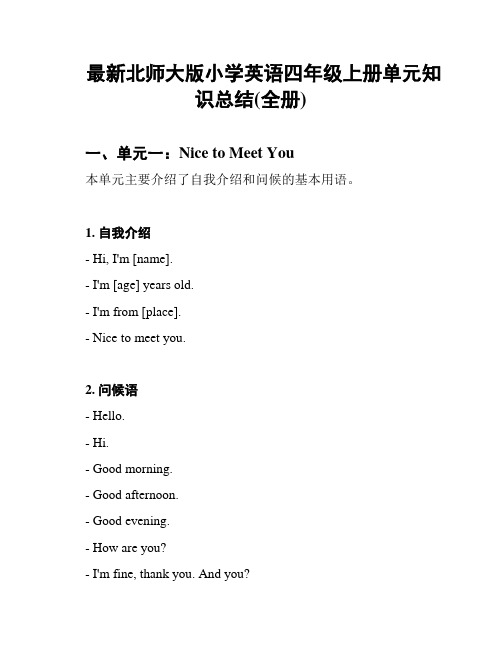
最新北师大版小学英语四年级上册单元知识总结(全册)一、单元一:Nice to Meet You本单元主要介绍了自我介绍和问候的基本用语。
1. 自我介绍- Hi, I'm [name].- I'm [age] years old.- I'm from [place].- Nice to meet you.2. 问候语- Hello.- Hi.- Good morning.- Good afternoon.- Good evening.- How are you?- I'm fine, thank you. And you?二、单元二:At School本单元主要介绍了与学校相关的词汇和日常用语。
1. 学校设施- Classroom - 教室- Library - 图书馆- Playground - 操场- Canteen - 食堂- School bus - 校车2. 日常用语- May I go to the bathroom? - 我可以去洗手间吗?- Can I have a pencil, please? - 我可以请你给我一支铅笔吗?- Thank you, teacher. - 谢谢你,老师。
三、单元三:In the Park本单元主要介绍了在公园中常见的景物和活动。
1. 公园景物- Tree - 树- Flower - 花- Lake - 湖- Swing - 秋千- Slide - 滑梯- Fountain - 喷泉2. 活动- Play on the swing - 在秋千上玩耍- Slide down the slide - 滑滑梯- Feed the ducks - 喂鸭子四、单元四:My Family本单元主要介绍了家庭成员的称呼和基本描述。
1. 家庭成员称呼- Father - 爸爸- Mother - 妈妈- Grandfather - 爷爷- Grandmother - 奶奶- Brother - 哥哥- Sister - 姐姐2. 描述- My father is tall and strong. - 我的爸爸又高又壮。
英语四年级上册北师大版

英语四年级上册北师大版一、单词部分。
1. 重点单词。
- 关于学校场所的单词。
- classroom(教室),这是学生们上课学习的地方,通常有桌椅、黑板等。
- library(图书馆),里面有很多书籍、杂志等供学生阅读和借阅。
- playground(操场),是学生们进行体育活动,如跑步、跳绳、打球的地方。
- 关于人物身份的单词。
- teacher(教师),负责教授学生知识和技能。
- student(学生),在学校里学习的人。
- 关于文具的单词。
- pen(钢笔),用于书写,笔尖较细。
- pencil(铅笔),可以用来写字、画画,写错了容易擦除。
- book(书),包含各种知识内容的纸质读物。
2. 单词记忆方法。
- 联想记忆法。
- 例如记忆“library”,可以联想到图书馆里有很多书(books),还有安静的阅读环境。
想象自己在图书馆里找书的情景,这样就能更好地记住这个单词。
- 分类记忆法。
- 把文具类单词放在一起记忆,如“pen、pencil、book”,可以制作单词卡片,一面写单词,一面画对应的物品,方便复习。
二、句型部分。
1. 询问地点的句型。
- Where is the classroom?(教室在哪里?)- It's on the first floor.(它在一楼。
)- 这个句型用于询问某个场所的位置,回答时要用表示方位的短语,如“on the second floor(在二楼)”“next to the library(在图书馆旁边)”等。
2. 介绍人物身份的句型。
- This is my teacher, Miss Li.(这是我的老师,李老师。
)- 可以用于向别人介绍自己的老师或者其他人物。
3. 关于拥有物品的句型。
- I have a new pen.(我有一支新钢笔。
)- He has a lot of books.(他有很多书。
)- 注意“have”和“has”的用法,第一人称(I、we)和第二人称(you)以及复数主语用“have”,第三人称单数(he、she、it)用“has”。
英语四年级上册单元知识点梳理 北京版
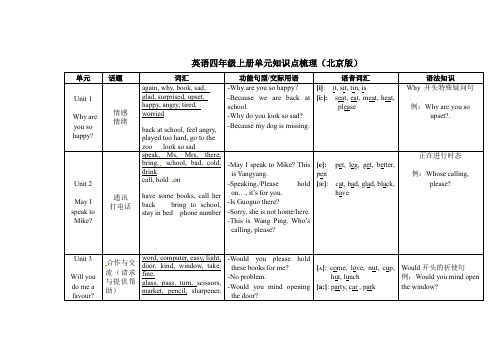
英语四年级上册单元知识点梳理(北京版)zoo look so sadspeak, Ms, Mrs, there,bring,school, bad, cold,drinkcall, hold onhave some books, call herback bring to school,stay in bed phone numberword, computer, easy, light,合作与交流(请求与提供帮助)ruler, bat, openturn off the light, close thewindow, pass me the water,open the door,borrow your markersReview of unit 1-3词汇功能句型/交际用语语法知识get, pen, kind, brown, think, shoe, buy, shop, shape, flavor, colour, that, this, those, these, pair, sneakers, sandals, overcoat looks nice, that pair of shoes these sandals, those sneakers -Which kind would you like? first,: teacher, winter, slipper,Which 开头疑问句例:Which kind would you like?eat, healthy, cook, duck, soup, sorry, chicken, vegetables, meatballs, jiaozi, salad, pizza, sandwich, ship, mushroom take order, order the food on your menu, for breakfast -What would you like to eat?-I’d like some vegetables.-May I take your order now?-Yes. I’d like/I’ll have asalad, fish, and mushroomsoup.-How much is it?-It’s sixty yuan.-Here is the money.[ai]: find, nice, kite, ice[æ]: cat, that, m a n, flag,hat, blackMay I 开头的疑问句。
四年级上北京版英语U5-U7知识点总结1

一、单词、短语1.颜色(colour):red红色blue蓝色yellow黄green绿色brown棕色black黑色white白色pink粉色purple紫色orange 橙色gray灰色2.鞋(shoes):sneakers运动鞋sandals凉鞋boots靴子slippers拖鞋3.服饰(clothes):jacket夹克衫trousers/ pants裤子shorts短裤coat外套overcoat大衣shirt衬衫T-shirt T恤skirt短裙dress连衣裙gloves手套uniform制服socks袜子cap帽子hat礼帽4.食物(food):meatball肉丸Peking Duck烤鸭chicken鸡肉fish鱼肉salad沙拉soup汤hamburger汉堡sandwich三明治chips薯条ice cream冰激凌pie 派pizza披萨cake蛋糕potato土豆cabbage卷心菜mushroom蘑菇5.饮品(drinks):water水milk牛奶tea茶soy milk豆浆juice 果汁6.数字(number):onetwothreefour fivesixseveneightnineteneleventwelvethirteenfourteenfifteensixteenseventeeneighteennineteentwenty20thirty30forty40fifty50sixty60seventy70eighty80ninety90one hundred100 7.自然(nature): snow雪,下雪rain雨,下雨wind风ice冰air空气8.天气(weather)snowy下雪的rainy多雨的windy刮风的cloudy多云的sunny阳光充足的fine晴朗的hot热的cold 冷的warm温暖的cool凉爽的9.地点(place)park school farm zoo forest lake grassland mountain10.季节(season)spring春天summer夏天autumn/fall秋天winter冬天动词短语:want to想要look nice看起来好look at看try .on试穿get cold 变冷take your order点餐become water变成水go to parks去公园take long walks去散步close to nature 亲近自然visit my uncle看望我的叔叔find out找到其他短语、短句:Excuse me打扰下here you are给您how much多少钱 a pair of一双how about怎么样Of course 当然for me 给我in summer在夏天In Sydney在悉尼on weekends在周末on a farm在农场in the forest在森林on the grassland在草原by the lake 在湖边in the mountains在山上on the internet 在网上二、句子:购物 1.Can I help you?/What can I do for you? 我能帮你吗?Yes. I want to get a pen. 是的。
北京版四年级上英语知识横向知识点整理
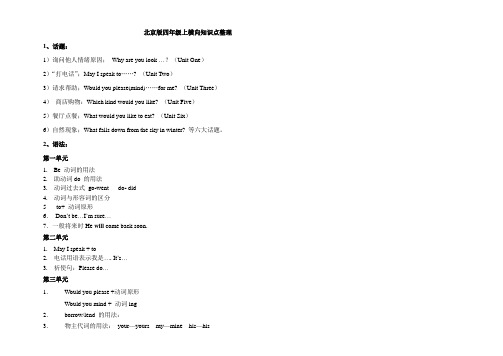
北京版四年级上横向知识点整理1、话题:1)询问他人情绪原因;Why are you look …?(Unit One)2)“打电话”;May I speak to……? (Unit Two)3)请求帮助;Would you please(mind)……for me? (Unit Three)4)商店购物:Which kind would you like? (Unit Five)5)餐厅点餐;What would you like to eat? (Unit Six)6)自然现象;What falls down from the sky in winter? 等六大话题。
2、语法:第一单元1.Be 动词的用法2.助动词do 的用法3.动词过去式go-went do- did4.动词与形容词的区分5to+ 动词原形6.Don’t be…I’m sure…7.一般将来时He will come back soon.第二单元1.May I speak + to2.电话用语表示我是…. It’s…3.祈使句:Please do…第三单元1.Would you please +动词原形Would you mind + 动词ing2.borrow/lend 的用法:3.物主代词的用法:your—yours my—mine his—hisher—hers its—its our—ours their—theirs第五单元1.动词三单This kind look s nice. This shop sell s jackets.2.will + 动词原形3.Kind/kinds 的区别4.情态动词Would的用法5.different kinds 中different---same 的区别及用法。
6.May, can, should 等词的区别与用法。
7.how much are they? How much—how many 的区别和用法。
北京课改版四年级英语上册全册知识点汇总
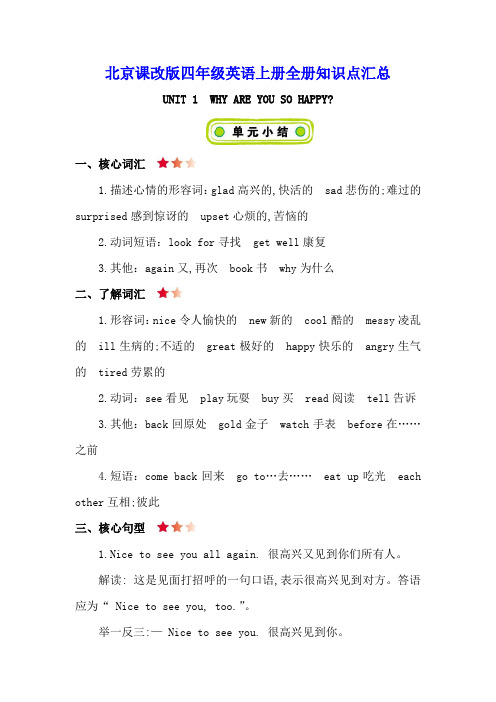
北京课改版四年级英语上册全册知识点汇总UNIT 1 WHY ARE YOU SO HAPPY?一、核心词汇1.描述心情的形容词:glad高兴的,快活的sad悲伤的;难过的surprised感到惊讶的upset心烦的,苦恼的2.动词短语:look for寻找get well康复3.其他:again又,再次book书why为什么二、了解词汇1.形容词:nice令人愉快的new新的cool酷的messy凌乱的ill生病的;不适的great极好的happy快乐的angry生气的tired劳累的2.动词:see看见play玩耍buy买read阅读tell告诉3.其他:back回原处gold金子watch手表before在……之前4.短语:come back回来go to…去……eat up吃光each other互相;彼此三、核心句型1.Nice to see you all again. 很高兴又见到你们所有人。
解读: 这是见面打招呼的一句口语,表示很高兴见到对方。
答语应为“ Nice to see you, too.”。
举一反三:— Nice to see you. 很高兴见到你。
— Nice to see you, too.很高兴见到你。
2.— Why are you so happy?你为什么这么高兴?— Because we are back at school. I like school. 因为我们回到学校了。
我喜欢学校。
解读: 这是询问原因及回答的句型。
句型结构: Why + be动词 + 主语 + 形容词?回答: Because + 原因.举一反三:— Why are you so tired?你为什么这么累?— Because I worked for 12 hours.因为我工作了12个小时。
— Why are you so sad?你为什么这么难过?— Because my dog is missing.因为我的狗丢了。
北京版四年级上册知识梳理(完整资料).doc

此文档下载后即可编辑北京版小学英语四上知识梳理Unit 1 Why are you so happy?feeling(情绪):sad悲伤的, surprised感到惊讶的, angry生气的, tired劳累的, excited 兴奋的, upset苦恼的, worried担心的,glad高兴的, happy,again又,再次, why为什么, book书, look for 寻找, get well 康复, messy脏乱的,missing丢失,hope希望,square正方形,worry担心back at school回校, played too hard玩得太累, come back回来, go to the zoo去动物园, eat up fish吃光鱼, read books读书, get well康复1. Why are you (so) happy? 你为什么(这么)高兴?Because we are back at school. 因为我们都回到了学校。
2. Why do you look so sad? 为什么你看起来这么伤心?Because my dog is missing. 因为我的狗丢了。
3. Nice to see you all again.很高兴再次见到你。
4. So do I.我也是。
5. D on’t be sad/upset. 别伤心/心烦。
6. I hope so. 我希望如此。
7. It’s square in shape and blue in colour. 它是方形,蓝色的。
8. Let’s look for it together. 我们一起寻找吧。
9. Don’t worry. 别担心。
10. She will get well soon. 她将很快康复的。
注意:句子的表达及人称和动词搭配I am, you/we/they are, he/she/ it is.I/you/we do, he/she/it doesUnit 2 May I speak to Mike?话题:打电话speak说话, robot机器人, housework家务劳动, Ms女士, Mrs太太, there在那里, really真的, bring带来, school学校, bad严重的, cold感冒, drink喝have a look看一看, do housework做家务, hold on稍等, call back回电话, bad cold重感冒, go to school去上学, stay in bed卧床休息, drink a lot of water大量喝水, play football踢足球, come to my birthday party参加我的生日聚会,bring… to school带到学校来,call back回电话,1. May I speak to Mike? This is Yangyang. 我能找一下麦克吗?我是洋洋。
京版小学英语四上知识总结
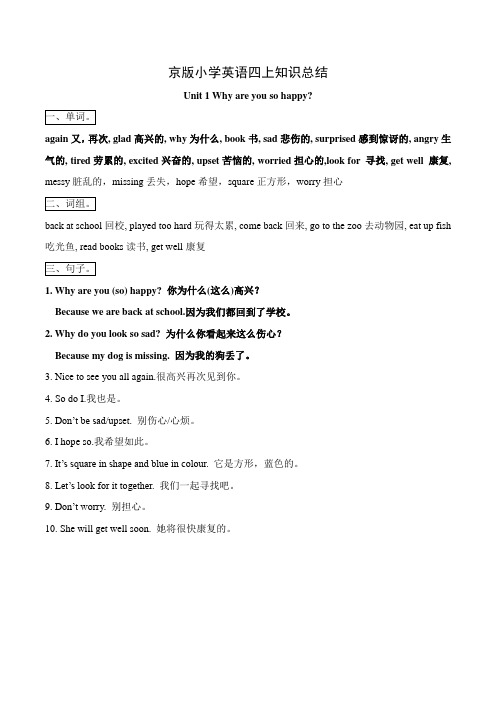
京版小学英语四上知识总结Unit 1 Why are you so happy?again又,再次, glad高兴的, why为什么, book书, sad悲伤的, surprised感到惊讶的, angry生气的, tired劳累的, excited兴奋的, upset苦恼的, worried担心的,look for 寻找, get well 康复, messy脏乱的,missing丢失,hope希望,square正方形,worry担心back at school回校, played too hard玩得太累, come back回来, go to the zoo去动物园, eat up fish 吃光鱼, read books读书, get well康复1. Why are you (so) happy? 你为什么(这么)高兴?Because we are back at school.因为我们都回到了学校。
2. Why do you look so sad? 为什么你看起来这么伤心?Because my dog is missing. 因为我的狗丢了。
3. Nice to see you all again.很高兴再次见到你。
4. So do I.我也是。
5. D on’t be sad/upset. 别伤心/心烦。
6. I hope so.我希望如此。
7. It’s square in shape and blue in colour. 它是方形,蓝色的。
8. Let’s look for it together. 我们一起寻找吧。
9. Don’t worry. 别担心。
10. She will get well soon. 她将很快康复的。
Unit 2May I speak to Mike?speak说话, robot机器人, housework家务劳动, Ms女士, Mrs太太, there在那里, really真的, bring带来, school学校, bad严重的, cold感冒, drink喝have a look看一看, do housework做家务, hold on稍等, call back回电话, bad cold重感冒, go to school去上学, stay in bed卧床休息, drink a lot of water大量喝水, play football踢足球, come to my birthday party参加我的生日聚会1. May I speak to Mike? This is Yangyang. 我能找一下麦克吗?我是洋洋。
北京版英语四年级上册知识要点汇总

UNIT1WHY ARE YOU SO HAPPY?一、核心词汇1.描述心情的形容词:glad高兴的,快活的sad悲伤的;难过的surprised感到惊讶的upset心烦的,苦恼的2.动词短语:look for寻找get well康复3.其他:again又,再次book书why为什么二、了解词汇1.形容词:nice令人愉快的new新的cool酷的messy凌乱的ill生病的;不适的great极好的happy快乐的angry生气的tired劳累的2.动词:see看见play玩耍buy买read阅读tell告诉3.其他:back回原处gold金子watch手表before在……之前4.短语:come back回来go to…去……eat up吃光each other互相;彼此三、核心句型1.Nice to see you all again.很高兴又见到你们所有人。
解读:这是见面打招呼的一句口语,表示很高兴见到对方。
答语应为“Nice to see you,too.”。
举一反三:—Nice to see you.很高兴见到你。
—Nice to see you,too.很高兴见到你。
2.—Why are you so happy?你为什么这么高兴?—Because we are back at school.I like school.因为我们回到学校了。
我喜欢学校。
解读:这是询问原因及回答的句型。
句型结构:Why+be动词+主语+形容词?回答:Because+原因.举一反三:—Why are you so tired?你为什么这么累?—Because I worked for12hours.因为我工作了12个小时。
—Why are you so sad?你为什么这么难过?—Because my dog is missing.因为我的狗丢了。
3.So do I.我也是。
解读:这是so引导的倒装句,表示前句叙述的情况也同样适合后句的人或物,意为“……也是”。
(完整版)北京版四年级上英语全册教材重点知识点整理

北京版四年级上全册教材知识点整理Unit 1 Why are you so happy?句型:1. 功能句型Why are you so happy?Because we are back to school again. I like school.Why do you look so sad?Because my dog is missing.Where did he go?He went to my grandpa's house.2. 重点句子Don’t be sad.I'm sure he will come back soon.I hope so. / I hope so, too.语法:1. 疑问词why 引导的询问原因的特殊疑问句及其回答2. be /look + 形容词3. be 动词的用法4. 形容词性的情绪词语与动词性的词语的使用方法5、动词过去式do—did, go—went;词汇: 1. 表达情绪和状态的单词:sad , surprised, glad, great, happy, excited, angry, tied, sleepy; to laugh, to cry2. 动词:are, look, hope,3. 疑问副词why, where, when, what, who, how4. 人称代词(主格):I, you, he, she, it, they,we,反义词:cry---laugh happy/glad---sad;5.6. 其他单词:too, again重点词组:back at school, played too hard, come back, go to the zoo eat up fish, read books,7.get well语音:1. 元音:a, i, o, y2. 元音字母组合:ai , oo, ere,ea, ee, au,3. 辅音字母组合gh, whUnit 2 May I speak to Mike?句型: 1. 功能句型:May I speak to Yangyang?It's Maomao. Speaking.Is Guoguo there?Sorry, she is not home/here.Who's speaking? It's Lingling.2.重要句型:Can I do ? /I am sure / I have a bad cold. I can . ’t go to schoo 语法: 1. speak to 和...说话,跟...说话;to 后面要用人称代词宾格形式。
北京版英语教材四年级上知识梳理
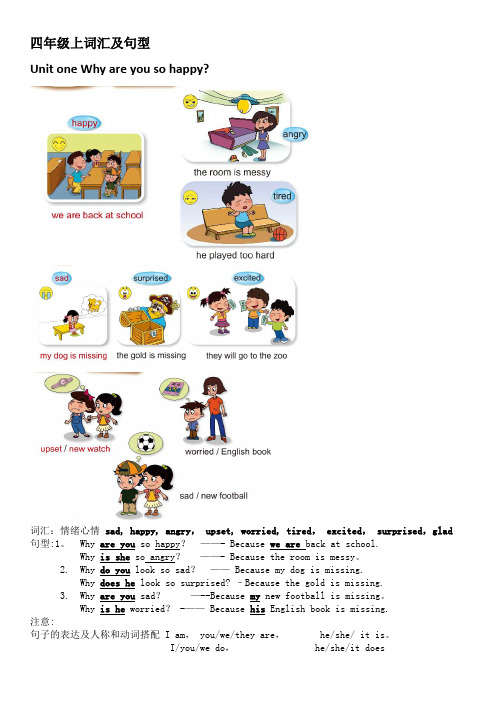
四年级上词汇及句型Unit one Why are you so happy?词汇:情绪心情 sad, happy, angry, upset, worried, tired, excited, surprised,glad 句型:1。
Why are you so happy?——- Because we are back at school.Why is she so angry?——- Because the room is messy。
2. Why do you look so sad?—— Because my dog is missing.Why does he look so surprised? –Because the gold is missing.3. Why are you sad?—--Because my new football is missing。
Why is he worried? -—— Because his English book is missing.注意:句子的表达及人称和动词搭配 I am, you/we/they are, he/she/ it is。
Unit two May I speak to Mike?话题:打电话短语表达: call打电话, call back回电话,speak, bring… to school带来telephone(cell phone手机,telegraph电报),My number is… bad cold重感冒 Stay in bed, drink a lot of waterWhat can I do for you?我能做些什么He is doing housework with his mother。
做家务I have…我有… I have some books。
He has a new robot.句型结构: 1. May I speak to Mike? This is Lingling.Speaking。
北京版四年级英语上学期复习重点
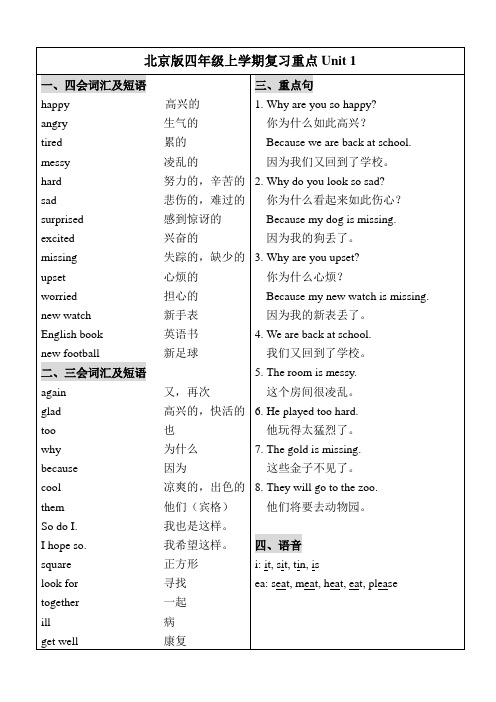
nature visit winter vacation farmer find out internet great say everything air or can’t = cannot without these thing spring summer autumn / fall winter
种类 形状 颜色 双(副,对) 那双鞋 那双拖鞋 这些凉鞋 这些靴子 那些运动鞋 红色那个 裤子 黑色大衣 蓝色 T 恤衫 短裤 黄色帽子 校服 与...搭配
获得 不同的 好看 ,漂亮 棕色 想,认为 舒服的
try…on certainly how much dollars It’s getting cold. shop buy sell how about won’t = will not 三、重点句
二、三会词汇及短语
hot become clever ice below zero weather degrees on weekends walk sounds interesting close
在悉尼 在昆明 在阿拉斯加州 坏的,糟糕的 好的,晴朗的 星星 冷的 雨,下雨 正在下雨 光亮的 雪,下雪 正在下雪 住,生活 在农场上 在森林里 在草原上 在湖边 在山里 我们 水 风筝(复数) 飞 风 植物 生长
三、重点句
高兴的 生气的 累的 凌乱的
1. Why are you so happy? 你为什么如此高兴?
Because we are back at school. 因为我们又回到了学校。
努力的,辛苦的 2. Why do you look so sad? 悲伤的,难过的 你为什么看起来如此伤心?
北京小学四年级英语知识点

北京小学四年级英语知识点北京小学四年级的英语课程通常涵盖了一些基础的语法知识、词汇学习、日常会话以及简单的阅读和写作技巧。
以下是一些四年级学生可能会学到的英语知识点:1. 基础语法:- 学习基本的时态,如一般现在时、现在进行时。
- 掌握名词的单复数形式,如cat/cats, book/books。
- 学习形容词的比较级和最高级,如big, bigger, biggest。
2. 词汇学习:- 扩充日常词汇量,包括食物、颜色、动物、数字、家庭成员等。
- 学习与学校相关的词汇,如classroom, teacher, student, lesson等。
3. 日常会话:- 学习基本的问候语和告别语,如Hello, Goodbye, How are you? - 学习询问和表达喜好,如I like..., I don't like..., Do you like...?4. 阅读技巧:- 阅读简单的英语故事和文章,理解基本的故事情节。
- 学习如何通过图片和上下文线索来猜测生词的意思。
5. 写作技巧:- 学习写简单的句子,如主语+谓语+宾语结构。
- 练习写日记或简短的描述性段落。
6. 听力理解:- 通过听英语歌曲、故事和对话来提高听力理解能力。
- 学习如何从听力材料中获取信息并回答问题。
7. 文化知识:- 了解一些英语国家的文化习俗,如节日、饮食习惯等。
- 学习一些简单的英语谚语和习语。
8. 课堂活动:- 参与小组讨论和角色扮演,以提高口语交流能力。
- 通过游戏和互动活动来巩固所学知识。
9. 学习策略:- 学习如何使用字典查找生词。
- 学习如何制定学习计划和复习策略。
10. 自我评估:- 学会自我检查作业和练习,识别并改正错误。
- 通过定期的自我测试来评估自己的学习进度。
通过这些知识点的学习,四年级的学生将能够在英语语言的各个方面打下坚实的基础,为今后的英语学习奠定良好的基础。
小学英语四年级上册北京版基础知识总复习
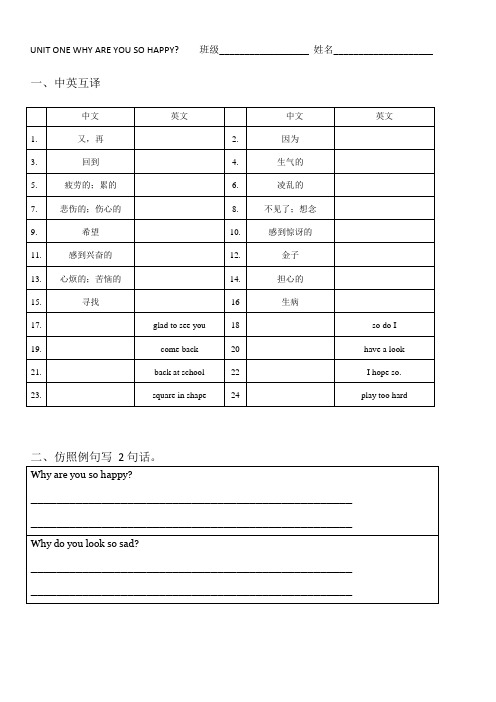
UNIT ONE WHY ARE YOU SO HAPPY? 班级__________________ 姓名____________________ 一、中英互译二、仿照例句写 2 句话。
三、根据课文内容,补全单词。
at school again. They like school. They are _____ to see each other. Guoguo is so happy, becauseis _____. Lingling _____ him not to be sad. Sheis _____. Yangyang _____ her to _____ _____ it, and tells her not to be _____. Yangyang looksUNIT TWO MAY I SPEAK TO MIKE? 班级__________________ 姓名____________________ 一、中英互译二、仿照例句写 2 句话。
三、根据课文内容,补全单词。
Shecannotgives Yangyang has a new ______. It’s a birthday gift________. He is now calling Mike, but Mike is _____. He is ______________ with his mum. He is a goodUNIT THREE WILL YOU DO ME A FAVOUR? 班级__________________ 姓名____________________ 一、中英互译二、仿照例句写 2 句话。
Maomao meets Sara in the street. He wants to get the key toto ______ these books for him. Sara is willing to ______. SheBaobao's grandma would like to play ____ _______ on theLingling is carrying things to the class, so she can't ______ the door. She asks Yangyang to help. He is very glad that heLingling's mom feels a little bit _____ when she sits on theMike and Baobao are going to have a ___________ match, but Baobao does not have his ping-pong _______ with him.goodUNIT FIVE WHICH KIND WOULD YOU LIKE? 班级__________________ 姓名____________________ 一、中英互译二、仿照例句写 2 句话。
北师大版四年级(上册)英语知识点总结
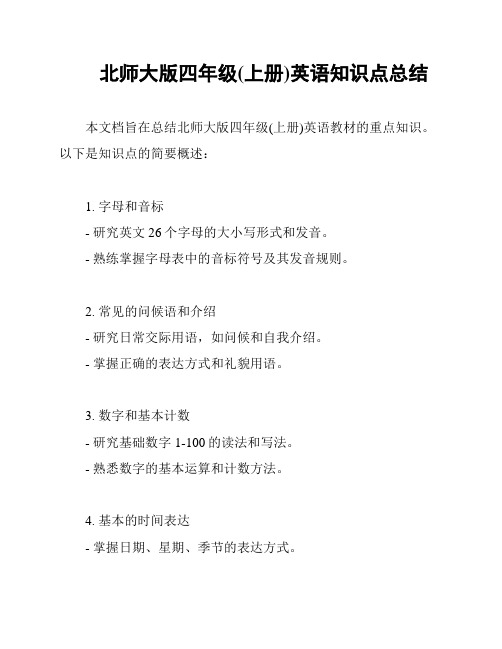
北师大版四年级(上册)英语知识点总结
本文档旨在总结北师大版四年级(上册)英语教材的重点知识。
以下是知识点的简要概述:
1. 字母和音标
- 研究英文26个字母的大小写形式和发音。
- 熟练掌握字母表中的音标符号及其发音规则。
2. 常见的问候语和介绍
- 研究日常交际用语,如问候和自我介绍。
- 掌握正确的表达方式和礼貌用语。
3. 数字和基本计数
- 研究基础数字1-100的读法和写法。
- 熟悉数字的基本运算和计数方法。
4. 基本的时间表达
- 掌握日期、星期、季节的表达方式。
- 研究日常时间的表达方式,如询问时间、描述一天的时间安排等。
5. 学校和教室用品
- 掌握学校和教室中常见物品的英文名称。
- 研究如何询问和描述这些物品。
6. 家庭成员和人物形容词
- 研究家庭成员的称呼,如父亲、母亲、兄弟姐妹等。
- 掌握描述人物外貌和性格的形容词。
7. 基本的食物和饮料
- 研究常见的食物和饮料的英文表达。
- 掌握如何提供和询问食物和饮料的服务。
8. 基本的地点和方位
- 研究常见地点和方位的英文表达,如家、学校、公园、上、下、左、右等。
- 熟悉如何问路和给出指示。
9. 基本的日常活动
- 研究描述日常活动的动词短语,如吃早饭、上学、看电视等。
- 熟练掌握这些动词短语的用法和时态。
以上是北师大版四年级(上册)英语教材的知识点总结。
希望本
文档对您有所帮助!。
北京四年级上英语全册教材知识点

北京版四年级上全册教材知识点整理Unit 1 Why are you so happy句型:1. 功能句型Why are you so happy?Because we are back to school again. I like school.Why do you look so sadBecause my dog is missing.Where did he goHe went to my grandpa's house.2. 重点句子Don’t be sad.I'm sure he will come back soon.I hope so. / I hope so, too.语法:1. 疑问词why引导的询问原因的特别疑问句及其答复2. be /look + 形容词3. be动词的用法4. 形容词性的情绪词语与动词性的词语的使用方法5、动词过去式do—did, go—went;词汇:1. 表达情绪和状态的单词:sad , surprised, glad, great, happy, excited, angry, tied, sleepy; to laugh, to cry2. 动词:are, look, hope,3. 疑问副词why, where, when, what, who, how4. 人称代词〔主格〕:I, you, he, she, it, they, we,5. 反义词:cry---laugh happy/glad---sad;6. 其他单词:t oo, again7. 重点词组:back at school, played too hard, come back, go to the zoo eat up fish, read books, get well语音:1. 元音:a, i, o, y2. 元音字母组合:ai , oo, ere,ea, ee, au,3. 辅音字母组合gh, whUnit 2 May I speak to Mike句型: 1. 功能句型:May I speak to YangyangIt's Maomao. Speaking.Is Guoguo thereSorry, she is not home/here.Who's speaking It's Lingling.2.重要句型:Can I do… /I am sure… / I have a bad cold. I can’t go to school.语法: 1. speak to 和...说话,跟...说话;to 后面要用人称代词宾格形式。
- 1、下载文档前请自行甄别文档内容的完整性,平台不提供额外的编辑、内容补充、找答案等附加服务。
- 2、"仅部分预览"的文档,不可在线预览部分如存在完整性等问题,可反馈申请退款(可完整预览的文档不适用该条件!)。
- 3、如文档侵犯您的权益,请联系客服反馈,我们会尽快为您处理(人工客服工作时间:9:00-18:30)。
UNIT1WHY ARE YOU SO HAPPY?一、核心词汇1.描述心情的形容词:glad高兴的,快活的sad悲伤的;难过的surprised感到惊讶的upset心烦的,苦恼的2.动词短语:look for寻找get well康复3.其他:again又,再次book书why为什么二、了解词汇1.形容词:nice令人愉快的new新的cool酷的messy凌乱的ill生病的;不适的great极好的happy快乐的angry生气的tired劳累的2.动词:see看见play玩耍buy买read阅读tell告诉3.其他:back回原处gold金子watch手表before在……之前4.短语:come back回来go to…去……eat up吃光each other互相;彼此三、核心句型1.Nice to see you all again.很高兴又见到你们所有人。
解读:这是见面打招呼的一句口语,表示很高兴见到对方。
答语应为“Nice to see you,too.”。
举一反三:—Nice to see you.很高兴见到你。
—Nice to see you,too.很高兴见到你。
2.—Why are you so happy?你为什么这么高兴?—Because we are back at school.I like school.因为我们回到学校了。
我喜欢学校。
解读:这是询问原因及回答的句型。
句型结构:Why+be动词+主语+形容词?回答:Because+原因.举一反三:—Why are you so tired?你为什么这么累?—Because I worked for12hours.因为我工作了12个小时。
—Why are you so sad?你为什么这么难过?—Because my dog is missing.因为我的狗丢了。
3.So do I.我也是。
解读:这是so引导的倒装句,表示前句叙述的情况也同样适合后句的人或物,意为“……也是”。
句型结构:So+be动词/助动词/情态动词+主语.举一反三:—I like English.我喜欢英语。
—So do I.我也喜欢。
—I eat an apple for dinner.我晚餐吃一个苹果。
—So does Jack.杰克也是。
4.He will come back soon.它很快就会回来的。
解读:这是一般将来时的肯定句,表示将要去做某事。
will后的动词要用原形。
句型结构:主语+will+动词原形+其他.举一反三:We will go to the park tomorrow.明天我们要去公园。
The panda will be back to China next week.那只熊猫将在下星期回到中国。
5.Don’t be upset.别苦恼。
解读:这是一个否定祈使句,用来表达劝告、叮嘱、请求或命令。
句型结构:Don’t+动词原形+其他.举一反三:Don’t be late.别迟到。
Don’t go out.别出去。
6.—What’s it like?它什么样儿?—It’s square in shape and blue in colour.它是方形的,蓝色的。
解读:这是what引导的特殊疑问句,用来询问人或事物的外表特征。
句型结构:What+be动词+主语+like?回答:主语+be动词+其他.举一反三:—What’s your brother like?你哥哥什么样儿?—He is tall and strong.他又高又壮。
四、了解句型1.I like school.我喜欢学校。
解读:like是动词,主语是第三人称单数时,like也要变为第三人称单数形式likes。
举一反三:Sara likes the new watch.萨拉喜欢这块新手表。
2.They are cool.它们很酷。
The room is messy.房间很乱。
解读:这是描述人或事物特征的句型。
be动词要随主语的变化而变化。
句型结构:主语+be动词+形容词.举一反三:The books are new.这些书是新的。
We are13.我们十三岁了。
3.I hope so.希望如此。
举一反三:I think so.我认为如此。
I don’t think so.我认为不是这样。
I guess so.我猜如此。
4.Zoey’s father buys her a pet dog.佐伊的爸爸给她买了一只宠物狗。
解读:这是表达给某人买某物的句型。
buy sb sth相当于buy sth for sb。
举一反三:I buy my son a watch.我给我儿子买了一块手表。
He buys his mother a flower.他给他妈妈买了一枝花。
5.Let’s look for it together.让我们一起找找吧。
解读:这是let引导的祈使句,用于向对方提出邀请或建议。
let后接不带to的动词不定式,构成短语let sb do sth,意思是“让某人做某事”。
句型结构:Let’s+动词原形+其他.举一反三:Let’s go home together.让我们一起回家吧。
Let’s be friends.让我们做朋友吧。
6.Maomao looks sad.毛毛看起来很难过。
解读:look在此作系动词,意为“看上去;看起来”。
举一反三:He looks happy.他看起来很高兴。
【拓展】常见的系动词还有:smell闻起来feel摸起来taste尝起来sound听起来UNIT2MAY I SPEAK TO MIKE?一、核心词汇1.动词:speak说话bring带来drink喝2.名词:robot机器人housework家务劳动school学校cold感冒3.其他:Ms女士Mrs夫人;太太really真的,是吗(表示疑问、惊讶、恼怒等) there在那里bad严重的,厉害的二、了解词汇1.名词:party聚会;宴会home家number数字phone电话water水football足球2.动词:call打电话stay停留;保持show展示3.其他:some一些them(宾格)他/她/它们who谁can能;会tomorrow明天with与(某人)在一起三、核心句型1.—May I speak to Mike?This is Yangyang.可以让迈克接电话吗?我是洋洋。
—Speaking.请讲。
解读:这是打电话给某人,接电话的正是要找的人的日常用语。
“May Ispeak to…?”意为“可以让……接电话吗?”,“This is….”表示“我是……”。
举一反三:—May I speak to Lily?This is Liangliang.可以让莉莉接电话吗?我是亮亮。
—Speaking.请讲。
—May I speak to Shasha?This is Tony.可以让莎莎接电话吗?我是托尼。
—Speaking.请讲。
2.I’m doing housework with my mum.我正在和我妈妈一起做家务。
解读:这是现在进行时的肯定句,表达某人正在做某事。
句型结构:主语+be动词+现在分词+其他.举一反三:Huanhuan is drinking water.欢欢正在喝水。
They are playing basketball.他们正在打篮球。
Lele and Sam are eating meat.乐乐和萨姆正在吃肉。
3.—Is Guoguo there?This is Sara.果果在吗?我是萨拉。
—Sorry,Sara.She’s not home.对不起,萨拉。
她不在家。
解读:这是打电话时询问及回答某人是否在的常用语。
举一反三:—Is Tom there?汤姆在吗?—Sorry,he is not home.对不起,他不在家。
—Is Tina there?蒂娜在吗?—Sorry,she is not here.对不起,她不在这儿。
4.—Who’s calling,please?请问谁在打电话?—This is Lingling.我是玲玲。
解读:这是询问及回答是谁在打电话的日常用语。
举一反三:—Who’s calling,please?请问谁在打电话?—This is Maomao.我是毛毛。
5.—Will you bring them to school tomorrow?你明天会把它们带到学校吗?—Yes,I will.是的,我会的。
解读:这是will引导的一般将来时的一般疑问句及其回答。
will not=won’t。
句型结构:Will+主语+动词原形+其他?回答:Yes,主语+will./No,主语+will not/won’t.—Will you come to my birthday party?你会来我的生日聚会吗?—Yes,I will.是,我会的。
—Will you go to the zoo on Sunday?你星期日会去动物园吗?—No,I won’t.不,我不会去。
四、了解句型1.Do you want to have a look?你想看一看吗?解读:这是询问对方是否想去做某事的句型。
want to do sth“想要去做某事”。
举一反三:Do you want to run with me?你想和我一起跑步吗?2.—What’s your phone number?你的电话号码是多少?—It’s….是……解读:这是询问及回答电话号码的句型。
举一反三:—What’s your phone number?你的电话号码是多少?—It’s8*******./87690345.是87690345。
/87690345。
3.I can’t go to school tomorrow.明天我不能去上学了。
解读:can’t=can not,是情态动词can的否定形式,意为“不能;不会”,后面跟动词原形。
举一反三:I can’t sing in English.我不会用英文唱歌。
They can’t drink coffee.他们不能喝咖啡。
4.She tells Miss Wang that she cannot go to school tomorrow.她告诉王老师她明天不能去上学。
解读:句中tell是“告诉”的意思,后面跟了双宾语,即某人、某事两个宾语。
that 起连接作用,不必翻译。
举一反三:Mum tells me that she wants to buy me a toy.妈妈告诉我她要给我买个玩具。
